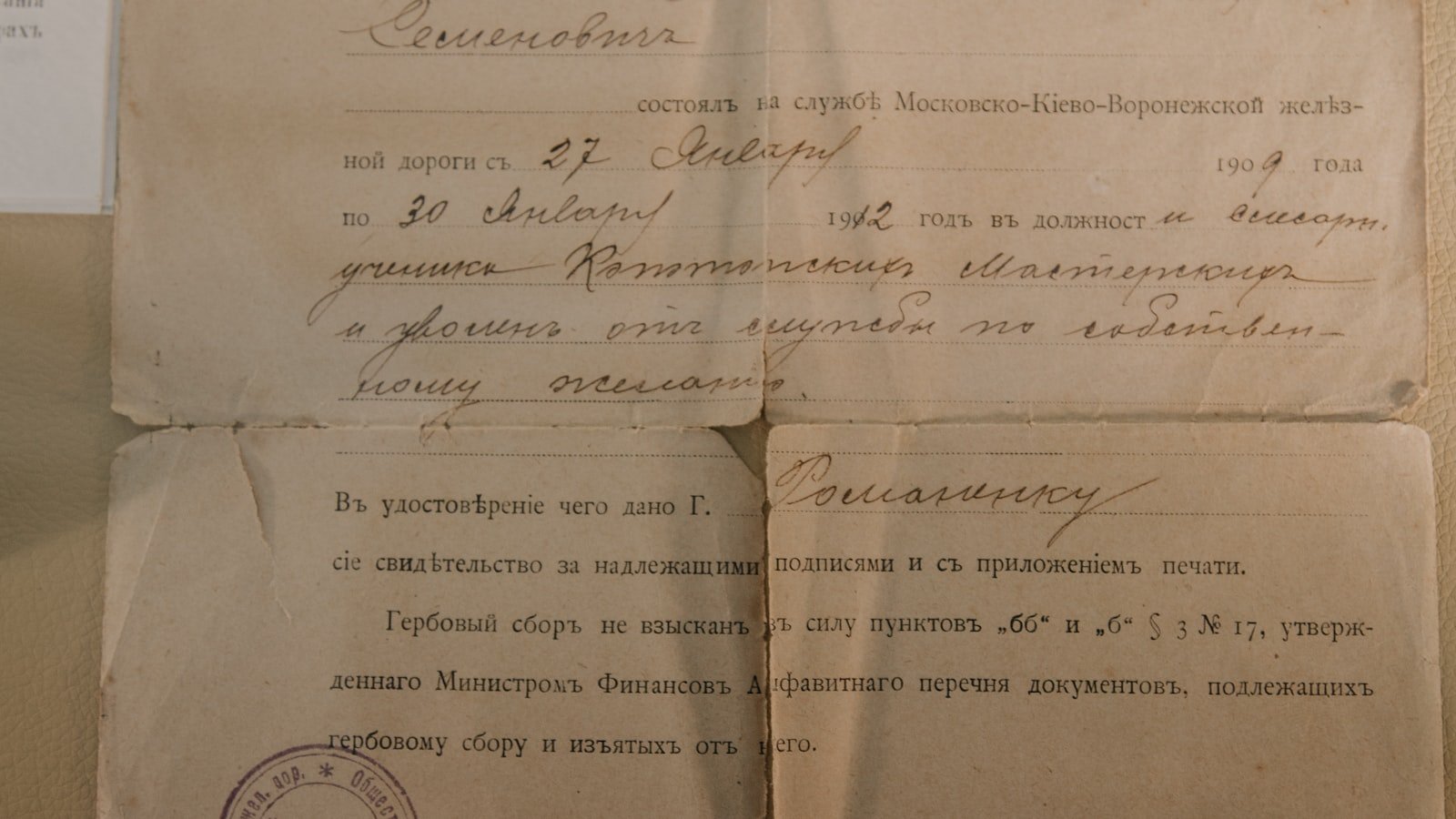Now Reading: How to Safeguard Important Documents in a Crisis
-
01
How to Safeguard Important Documents in a Crisis

How to Safeguard Important Documents in a Crisis
In the depths of uncertainty and chaos, there exist moments that remind us of the fragility of our lives. Natural disasters, unforeseen emergencies, or even the unexpected turn of events can abruptly disrupt our sense of order. Amidst the frenzy, safeguarding our important documents may not be the first thing that crosses our minds. Yet, in times of crisis, these cherished papers can become a lifeline. They hold the power to rebuild our lives, reclaim our identities, and provide a glimmer of hope in the face of adversity. So, how can we shield our critical documents from the unpredictable storms that life throws our way? In this guide, we unravel the art of safeguarding your vital records, equipping you with the knowledge to protect your keepakes and essential paperwork in even the most challenging of times.
Table of Contents
- Preparing for the Worst: Safeguarding Your Important Documents
- Understanding the Implications: Why Document Protection is Crucial in a Crisis
- Essential Steps to Protect and Store Your Vital Documents
- Creating a Digital Backup: Ensuring Security for Your Important Files
- Safekeeping on the Go: Portable Solutions for Document Protection
- Q&A
- Insights and Conclusions

Preparing for the Worst: Safeguarding Your Important Documents
When it comes to safeguarding your important documents, it’s always better to be safe than sorry. You never know when a disaster might strike, but by following a few simple steps, you can ensure that your documents are protected and easily accessible, no matter what happens.
1. Create digital backups:
- Scan all your important documents and save them as digital files. This includes birth certificates, passports, financial records, insurance policies, and any other documents you deem crucial.
- Store these digital backups in a secure location, such as an external hard drive or a cloud-based storage service. Make sure to encrypt your files for added security.
2. Organize and categorize:
- Sort your physical documents into categories, such as personal, financial, medical, and legal.
- Invest in sturdy folders or file cabinets and label each one clearly. Use dividers or color-coding to differentiate between different types of documents. This will make it easier to locate specific documents when needed.
3. Store in a fireproof safe:
- Invest in a fireproof safe to protect your most important physical documents.
- Keep originals of crucial documents, such as birth certificates or wills, in the safe. Make sure to also include any hard drives or storage devices containing your digital backups.
By following these precautions, you can minimize the risk of losing your important documents in the event of a disaster. Remember to review and update your backups regularly to ensure they remain up to date. It’s better to take these extra steps now than to regret it later!

Understanding the Implications: Why Document Protection is Crucial in a Crisis
Understanding the Implications
When a crisis strikes, whether it be a natural disaster, a cyber attack, or any other unforeseen event, the importance of document protection becomes even more evident. The implications of not having a robust system in place to safeguard critical information can be far-reaching and detrimental. Here are some reasons why document protection is crucial during a crisis:
- Preserving confidential data: In times of crisis, the risk of unauthorized access to confidential information increases significantly. Having appropriate document protection measures in place ensures that sensitive data remains secure and inaccessible to those who shouldn’t have access to it.
- Ensuring business continuity: Documents that are essential for carrying out day-to-day operations can easily be lost or destroyed during a crisis. By protecting vital documents, businesses can reduce the risk of disruption and ensure smooth operations even in the face of adversity.
- Meeting legal and regulatory requirements: Many industries have strict compliance regulations that govern the handling and storage of sensitive information. Failing to protect documents can lead to severe financial and legal consequences.
Investing in document protection not only mitigates risks but also provides peace of mind to individuals and organizations alike. From preventing data breaches to ensuring business continuity, the implications of robust document protection are crucial in times of crisis.

Essential Steps to Protect and Store Your Vital Documents
Keeping your vital documents safe and secure is crucial for both personal and professional reasons. Whether it’s your birth certificate, passport, or important legal papers, protecting these documents from damage, loss, or theft is essential. Follow these essential steps to ensure the safety and proper storage of your vital documents:
- Organize: Start by organizing your documents into categories such as personal, financial, medical, and legal. This will make it easier to locate specific documents when needed.
- Digitize: Scan and create digital copies of all your vital documents. Store these copies on a secure, password-protected cloud storage service or an external hard drive. Having digital copies provides an extra layer of protection against physical damage or loss.
- Store Safely: Choose a secure location to store your original physical documents. Consider investing in a fireproof and waterproof safe or a safety deposit box at a trusted bank. Ensure that the chosen storage area is accessible to you but not easily accessible to others.
- Use Protective Sleeves: To prevent damage from dust, moisture, or sunlight, consider using acid-free plastic sleeves or sheet protectors for your documents. This adds an additional layer of protection and safeguards against wear and tear.
- Label and Seal: Clearly label each folder or envelope that contains your vital documents. Use clear, waterproof labels and seal the folders or envelopes with tamper-proof stickers to ensure that any tampering attempts are easily noticeable.
- Regularly Update: Set a reminder to review and update your vital documents regularly. Update any changes in personal information, beneficiary details, or renewal dates as needed. This ensures that your documents are always up to date and accurate.
- Share with Trusted Individuals: Inform a trusted family member or friend about the location of your vital documents. This can be beneficial in case of emergencies or unexpected circumstances. However, ensure that you trust the person completely and consider providing limited access to only essential documents.
By following these essential steps, you can have peace of mind knowing that your vital documents are well-protected, easily accessible, and in proper order whenever you need them.

Creating a Digital Backup: Ensuring Security for Your Important Files
Ensuring the security of your important files is crucial in this digital age. Creating a digital backup not only provides peace of mind but also protects your valuable data from unexpected disasters, such as hardware failure or accidental deletion. To help you safeguard your files, here are some key tips to follow:
- Choose a reliable backup solution: Select a trusted digital storage platform that offers robust security features, encryption options, and frequent backups.
- Implement strong passwords: Create unique, complex passwords for your backup system to prevent unauthorized access. Consider using a password manager to generate and store secure passwords.
- Enable two-factor authentication: Add an extra layer of protection by enabling two-factor authentication for your backup service. This ensures that even if your password is compromised, an additional verification step will prevent unauthorized access.
- Regularly update your backup: Keep your backup files up to date by scheduling automatic backups or manually uploading new versions. Set reminders to ensure your data is consistently backed up.
- Encrypt important files: Prioritize encrypting sensitive files before storing them in your backup. This adds an extra layer of security and protects your data from potential breaches.
By following these guidelines, you can create a robust digital backup system that guarantees the security and accessibility of your important files at all times.
Safekeeping on the Go: Portable Solutions for Document Protection
When it comes to protecting important documents, having a portable solution can be a game-changer. Whether you’re a frequent traveler, a student, or a professional on the go, having the ability to securely store and access your documents anytime, anywhere is invaluable.
Portable document protection solutions come in various forms, each offering its own unique features and benefits. One option is the encrypted USB drive. These compact devices offer hardware encryption, ensuring that your documents are protected even if the drive falls into the wrong hands. With password authentication and data encryption, you can feel confident that your sensitive information is safe.
Another popular option is the cloud storage service. With a cloud storage provider, you can securely store your documents online and access them from any device with an internet connection. Many cloud storage services offer robust security measures, such as end-to-end encryption and multi-factor authentication, giving you peace of mind knowing that your documents are safely stored in the cloud.
- Advantages of portable solutions for document protection:
- Convenience: With portable solutions, you can carry your important documents with you wherever you go, ensuring quick and easy access.
- Security: Encrypted USB drives and cloud storage services offer advanced security features to protect your documents from unauthorized access.
- Backup and Recovery: With portable solutions, you can easily create backups of your documents, safeguarding against data loss.
Whether you choose an encrypted USB drive or leverage a cloud storage service, portable solutions for document protection provide you with the flexibility and peace of mind you need in today’s fast-paced world.
Q&A
Why is it important to safeguard important documents in a crisis?
Answer: Safeguarding important documents during a crisis ensures that your personal and financial information is protected and easily accessible when you need it the most. It helps you rebuild your life and deal with legal, financial, or medical matters efficiently.
What are some important documents that should be safeguarded?
Answer: Some important documents that should be safeguarded include passports, social security cards, birth certificates, wills, deeds, insurance policies, financial statements, and any other legal or vital documents that are crucial for your identity and well-being.
What are the best ways to safeguard important documents?
Answer: The best ways to safeguard important documents are by keeping physical copies in a secure place, such as a fireproof safe or a safety deposit box. Additionally, it is essential to create digital copies by scanning the documents and storing them securely in password-protected folders or using cloud storage options.
Are there any additional precautions to take when safeguarding important documents?
Answer: Yes, it is important to regularly update your documents and ensure they are still valid and accurate. Consider sharing copies of essential documents with a trusted family member or friend, so they can assist you in case of emergencies. It is also crucial to have a reliable backup system for your digital copies to prevent any loss of data.
What should be done in case of a natural disaster or evacuation?
Answer: In the event of a natural disaster or evacuation, it is advisable to have a “grab-and-go” bag ready with copies of your important documents and emergency supplies. Keep this bag in a convenient location, so you can quickly access it if needed. Inform yourself about local emergency protocols and have a clear plan in place for document retrieval or replacement.
How can one protect their digital documents in a crisis?
Answer: To protect digital documents, ensure you have robust antivirus and firewall software installed on your devices. Regularly back up your files to an external hard drive or cloud storage service. Remember to use strong, unique passwords and enable two-factor authentication whenever possible to add an extra layer of security.
Insights and Conclusions
As we wrap up this guide on how to safeguard your important documents in times of crisis, let’s take a moment to reflect on the power of preparedness. In an unpredictable world, where unforeseen circumstances can toss us into the midst of chaos, ensuring the safety of our most valuable papers is an act of proactive resilience.
Remember, with a little foresight and organization, you can shield your documents from the jaws of destruction and safeguard your most cherished memories. By adopting simple yet effective strategies, such as digitizing and storing backups, utilizing fireproof and waterproof containers, and sharing access with trusted confidants, you are erecting an impenetrable fortress around your vital information.
Whether you seek protection from natural disasters, theft, or even the ravages of time, safeguarding your important documents is no longer an arduous task. With every forethought you make, you weave a safety net that extends itself to encompass your peace of mind, granting you the freedom to navigate life’s most turbulent moments with confidence.
Now armed with knowledge and armed with purpose, go forth and fortify the realm of your essential documents. May your intentions be illuminated, may your organization be meticulous, and may your guardianship remain steadfast. For in the face of any crisis, it is not merely paper and ink that you safeguard, but the stories, the dreams, and the legacies that help define who we are.
Let these words be the catalyst to inspire you to take action, to embark on a journey of preparedness, and to elevate yourself beyond the realm of uncertainty. May your documents find solace amidst the storm and thrive in the realm of untold heroes.
Stay prepared, stay resilient, and let the fortification of your valuable documents be a testament to your enduring spirit. For in these actions, we defy the chaos and embrace the triumphant symphony of preparedness, turning the tide of any crisis in our favor.
Remember, in the darkest of times, it is the light of preparedness that guides us to safety, victory, and renewal. So, be the guardian your important documents deserve, and let the fortress of readiness stand tall, for you hold the key to their survival.
Stay alert, stay proactive, and may your documents weather all storms undeterred.
As an affiliate, my content may feature links to products I personally use and recommend. By taking action, like subscribing or making a purchase, you’ll be supporting my work and fueling my taco cravings at the same time. Win-win, right?
Want to read more? Check out our Affiliate Disclosure page.




